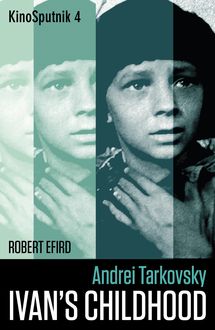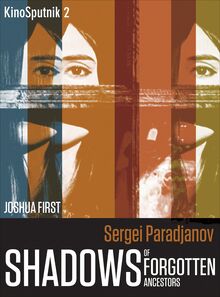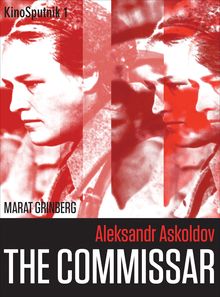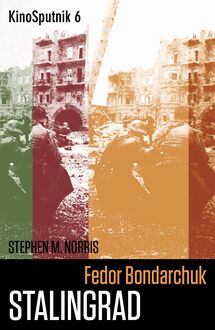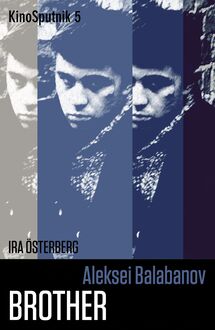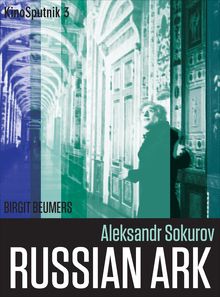-
 Univers
Univers
-
 Ebooks
Ebooks
-
 Livres audio
Livres audio
-
 Presse
Presse
-
 Podcasts
Podcasts
-
 BD
BD
-
 Documents
Documents
-
- Cours
- Révisions
- Ressources pédagogiques
- Sciences de l’éducation
- Manuels scolaires
- Langues
- Travaux de classe
- Annales de BEP
- Etudes supérieures
- Maternelle et primaire
- Fiches de lecture
- Orientation scolaire
- Méthodologie
- Corrigés de devoir
- Annales d’examens et concours
- Annales du bac
- Annales du brevet
- Rapports de stage
La lecture à portée de main
Vous pourrez modifier la taille du texte de cet ouvrage
Découvre YouScribe en t'inscrivant gratuitement
Je m'inscrisDécouvre YouScribe en t'inscrivant gratuitement
Je m'inscrisEn savoir plus
Vous pourrez modifier la taille du texte de cet ouvrage
En savoir plus

Description
This book is the first companion to the film in any language. It recounts the film’s plot and turbulent production history, and it also offers a close analysis of the artistic vision of its director, Aleksandr Askoldov, and the ways that viewers can trace in the film not only his complex aesthetics, but also the personal crises he endured in the years leading up to the film. The result is an indispensable companion to an unforgettable film.
Note on transliteration
Acknowledgements
KinoSputniks general editors’ preface
List of illustrations
Production credits
Plot summary
Chapter 1: Introduction: Production history
Chapter 2: Literary sources
Chapter 3: Film analysis
Chapter 4: 1987 and after: Critical reception and debates
Sujets
Informations
| Publié par | Intellect Books |
| Date de parution | 10 novembre 2016 |
| Nombre de lectures | 0 |
| EAN13 | 9781783207084 |
| Langue | English |
Informations légales : prix de location à la page 0,1560€. Cette information est donnée uniquement à titre indicatif conformément à la législation en vigueur.
Extrait
First published in the UK in 2016 by
Intellect, The Mill, Parnall Road, Fishponds, Bristol, BS16 3JG, UK
First published in the USA in 2016 by
Intellect, The University of Chicago Press, 1427 E. 60th Street,
Chicago, IL 60637, USA
Copyright © 2016 Intellect Ltd
All rights reserved. No part of this publication may be reproduced, stored in a retrieval system, or transmitted, in any form or by any means, electronic, mechanical, photocopying, recording, or otherwise, without written permission.
A catalogue record for this book is available from the British Library.
Copy-editor: Michael Eckhardt
Cover designer: Emily Dann
Production manager: Matthew Floyd
Typesetting: Contentra Technologies
ISBN: 978-1-78320-706-0
ePDF: 978-1-78320-707-7
ePUB: 978-1-78320-708-4
KinoSputniks:
Series Editors: Birgit Beumers & Richard Taylor
Editorial Board: Julian Graffy, Denise Youngblood
Current titles:
Aleksandr Askoldov: The Commissar by Marat Grinberg
Sergei Paradjanov: Shadows of Forgotten Ancestors by Joshua First
Aleksandr Sokurov: Russian Ark by Birgit Beumers
To my grandfather Mikhail Goldis with gratitude and love
CONTENTS
Note on transliteration
Acknowledgements
KinoSputniks general editors’ preface
List of illustrations
Production credits
Plot summary
Chapter 1: Introduction: Production history
Chapter 2: Literary sources
Chapter 3: Film analysis
Chapter 4: 1987 and after: Critical reception and debates
References
Notes
Note on transliteration
The Library of Congress system has been used throughout, with the following exceptions: when a Russian name has an accepted English spelling (e.g. Tchaikovsky instead of Chaikovskii; Chaliapin instead of Shaliapin), or when Russian names are of Germanic origin (e.g. Eisenstein instead of Eizenshtein; Schnittke instead of Shnitke).
Acknowledgements
I am grateful to Richard Taylor, Birgit Beumers and everyone at Intellect for taking on this project and making it a reality. I owe a debt of gratitude to Aleksandr Askol'dov, with whom I conducted a series of phone and Skype interviews in spring 2015. I am enormously thankful to Radislav Lapushin and Stuart Liebman for reading the manuscript in its entirety and offering their important suggestions. I am also thankful to Anna Kupinska and David Roizen for providing some of the archival materials and photographs. I am equally thankful to the staff at the Russian State Archive of Literature and Art for providing a copy of the film’s script. I am fortunate to have been able to discuss The Commissar individually and at various conferences with Nancy Condee, Yuri Tsivian, Olga Gershenson, Harsha Ram, Luba Golburt, Harriet Murav, Elizabeth Duquette, and Katja Garloff. I am thankful to Hillary Larson for help with translating from French, and to Gennady Estraikh for help with understanding a Yiddish phrase in the film. Finally, writing this book was both an intellectual and personal journey for me. I was born in Kamenets-Podol'skii, ten years after The Commissar was shot there, and grew up with anecdotes about the production from my grandparents and mother, who then lived in the city: from spotting the actors and the crew around town, to the travails of a local Jewish woman who was injured by a horse during the shoot. I am grateful to my grandfather, mother and sister for their encouragement and support, and to my wife and son for their love, care and patience.
KinoSputniks general editors’ preface
This series intends to examine closely some key films to have emerged from the history of Russian and Soviet cinema. Continuing from KinoFiles (2000–2010), the KinoSputniks are intended for film enthusiasts and students alike, combining scholarship with a style of writing that is accessible to a broad readership. Each KinoSputnik is written by a specialist in the field of Russian and/or film studies, and examines the production, context and reception of the film, whilst defining the film’s place in its national context and in the history of world cinema.
Birgit Beumers & Richard Taylor
Wales, June 2016
List of illustrations
1. Aleksandr Askol'dov. Photo courtesy of Aleksandr Varlamov.
2. Production stills from Svetlana Kim’s piece in Sovetskii ekran .
3. Dominican cathedral. Kamenets-Podol'skii (c. 1960s). Photo courtesy of David Roizen.
4. A young soldier in the square. Still from the film.
5. Vavilova condemns Emelin to death. Still from the film.
6. Magazanik’s house today. Photo courtesy of David Roizen.
7. Vavilova and Magazanik: the first meeting. Still from the film.
8. Vavilova’s first night at the Magazanik house. Still from the film.
9. Mikhail Greim, ‘Jewish Types of the Podol'e Governorate’.
10. Efim and Maria make a dress for Vavilova. Still from the film.
11. Askol'dov and Nedashkovskaia on the set. Image provided by David Roizen.
12. Vavilova, the future mother. Still from the film.
13. Grandmother Magazanik (Liudmila Volynskaia). Still from the film.
14. Efim and Maria assist Vavilova in labour. Still from the film.
15. Vavilova’s second vision. Still from the film.
16. Vavilova’s third vision: death of the beloved. Still from the film.
17. Ivan Shadr, ‘A Cobblestone is the Weapon of the Proletariat’.
18. Vavilova’s procession to the synagogue. Still from the film.
19. Inside the ruined synagogue. Still from the film.
20. Vavilova in the synagogue arch. Still from the film.
21. The rabbi (Valerii Ginzburg). Still from the film.
22. Tailors’ synagogue after the war. Image courtesy of Anna Kupinska.
23. ‘Procession of the doomed’. Still from the film.
24. Holocaust memorial with an inscription in Yiddish, Kamenets-Podol'skii. Photo courtesy of Anna Kupinska.
25. Magazanik screaming after Vavilova. Still from the film.
Production credits Production Company: Gor'kii Studio, Mosfil'm, 1966–67 Release Date: 11 July 1987 Director : Aleksandr Askol'dov Screenplay : Aleksandr Askol'dov Cinematographer : Valerii Ginzburg Production Design : Sergei Serebrеnikov Composer : Alfred Schnittke Editor : Natal'ia Loginova, Svetlana Liashinskaia and Nina Vasil'eva Running Time : 110 minutes
CAST Commissar Klavdiia Vavilova Nonna Mordiukova Efim Magazanik Rolan Bykov Maria Magazanik Raisa Nedashkovskaia Regiment’s Commander Kozyrev Vasilii Shukshin Vavilova’s lover Otar Koberidze Regiment’s Officer Leonid Reutov Emelin Viktor Shakhov Grandmother (Efim’s mother) Liudmila Volynskaia Roza Magazanik Liuba Kats Magazanik’s Sons Pavlik Levin, Igor' Fishman, Dima Kleiman Street Musician Vutsia Mitsman Young Soldier Vladimir Donilin Catholic Priest V. Grigor'ev Rabbi Valerii Ginzburg
Plot summary
The Commissar takes place during the Russian Civil War, in 1920 or 1921. A Red Army regiment enters a Jewish town in Ukraine, gloomy and half-ruined, with eerily empty cobblestone streets and decrepit mediaeval towers. The regiment is led by Commissar Klavdiia Vavilova, an imposing and coarse woman. Emelin, one of the soldiers, is arrested for desertion. Vavilova presides over his execution by firing squad in the town square. Her devotion to the Bolshevik cause is ruthless and fanatical.
The irony is that this crude ‘manly’ woman is pregnant. She confides her predicament to the regiment’s commander who, baffled by the situation, reluctantly decides to have her stationed with a local Jewish family, in whose quarters she could give birth. The family are the Magazaniks, consisting of the father Efim, a poor tinker, his wife Maria, his elderly mother, and five small children: three boys, an older daughter and a baby. Efim is outraged by the ‘addition’ to his household. Non-ideological and living in the moment, he is the very antithesis of Vavilova. She treats the Jewish household as a foreign and frightening place.
Maria, an experienced and decisive woman, reaches out to Vavilova. Her suspicions that the commissar is carrying a child are confirmed. Maria ‘educates’ Vavilova in the ways of motherhood, domesticity and femininity, while Efim gradually warms to her as well. Vavilova in turn begins to feel much more comfortable in the new surroundings.
Assisted by Maria and the grandmother, Vavilova gives birth and experiences apocalyptic visions. She has a son. Proud of her child, she takes him on a walk through the town, where she visits the Orthodox cathedral, the Catholic church and the ruined synagogue. On the way back home, Vavilova is hounded by her regiment’s soldiers. Once a brutal commissar, she turns into a defenceless woman.
The next day Vavilova is visited by the regiment’s commander and an officer, who inform her that they will retreat from the town due to the advances of the Whites. Vavilova, who cannot travel with the baby, has no choice but to stay behind. Efim bravely tells her that she will remain with them, even if harbouring the commissar would jeopardize their very lives.
As the Reds withdraw and the town prepares for a new invasion, the Magazaniks and Vavilova are hiding in the house’s cellar with the child. Efim is furious at his sons, who earlier engaged in a brutal game with their older sister. Pretending to be the perpetrators of a pogrom, they assaulted the girl and symbolically raped her. In the cellar, Vavilova and Efim engage in a debate about the nature of the Revolution and Jewish suffering. While he advocates the ‘Internationale of kindness’, she passionately argues for the necessity of Revolutionary violence. To comfort the children, who are frightened by the explosions outside, Efim engages them in a ritualistic dance. As Vavilova observes the Magazaniks, she experiences a Holocaust vision: the local Jews, with the Star of David on their clothes – among them Efim with the family – march into a large, open stone structure with smoke billowing from its chimney, at the top of which sit inmates in striped uniforms.
The vision is interrupted and Vavilova rushes away from the cellar. She returns to the house and breastfeeds her son for t
-
 Univers
Univers
-
 Ebooks
Ebooks
-
 Livres audio
Livres audio
-
 Presse
Presse
-
 Podcasts
Podcasts
-
 BD
BD
-
 Documents
Documents
-
Jeunesse
-
Littérature
-
Ressources professionnelles
-
Santé et bien-être
-
Savoirs
-
Education
-
Loisirs et hobbies
-
Art, musique et cinéma
-
Actualité et débat de société
-
Jeunesse
-
Littérature
-
Ressources professionnelles
-
Santé et bien-être
-
Savoirs
-
Education
-
Loisirs et hobbies
-
Art, musique et cinéma
-
Actualité et débat de société
-
Actualités
-
Lifestyle
-
Presse jeunesse
-
Presse professionnelle
-
Pratique
-
Presse sportive
-
Presse internationale
-
Culture & Médias
-
Action et Aventures
-
Science-fiction et Fantasy
-
Société
-
Jeunesse
-
Littérature
-
Ressources professionnelles
-
Santé et bien-être
-
Savoirs
-
Education
-
Loisirs et hobbies
-
Art, musique et cinéma
-
Actualité et débat de société
- Cours
- Révisions
- Ressources pédagogiques
- Sciences de l’éducation
- Manuels scolaires
- Langues
- Travaux de classe
- Annales de BEP
- Etudes supérieures
- Maternelle et primaire
- Fiches de lecture
- Orientation scolaire
- Méthodologie
- Corrigés de devoir
- Annales d’examens et concours
- Annales du bac
- Annales du brevet
- Rapports de stage
